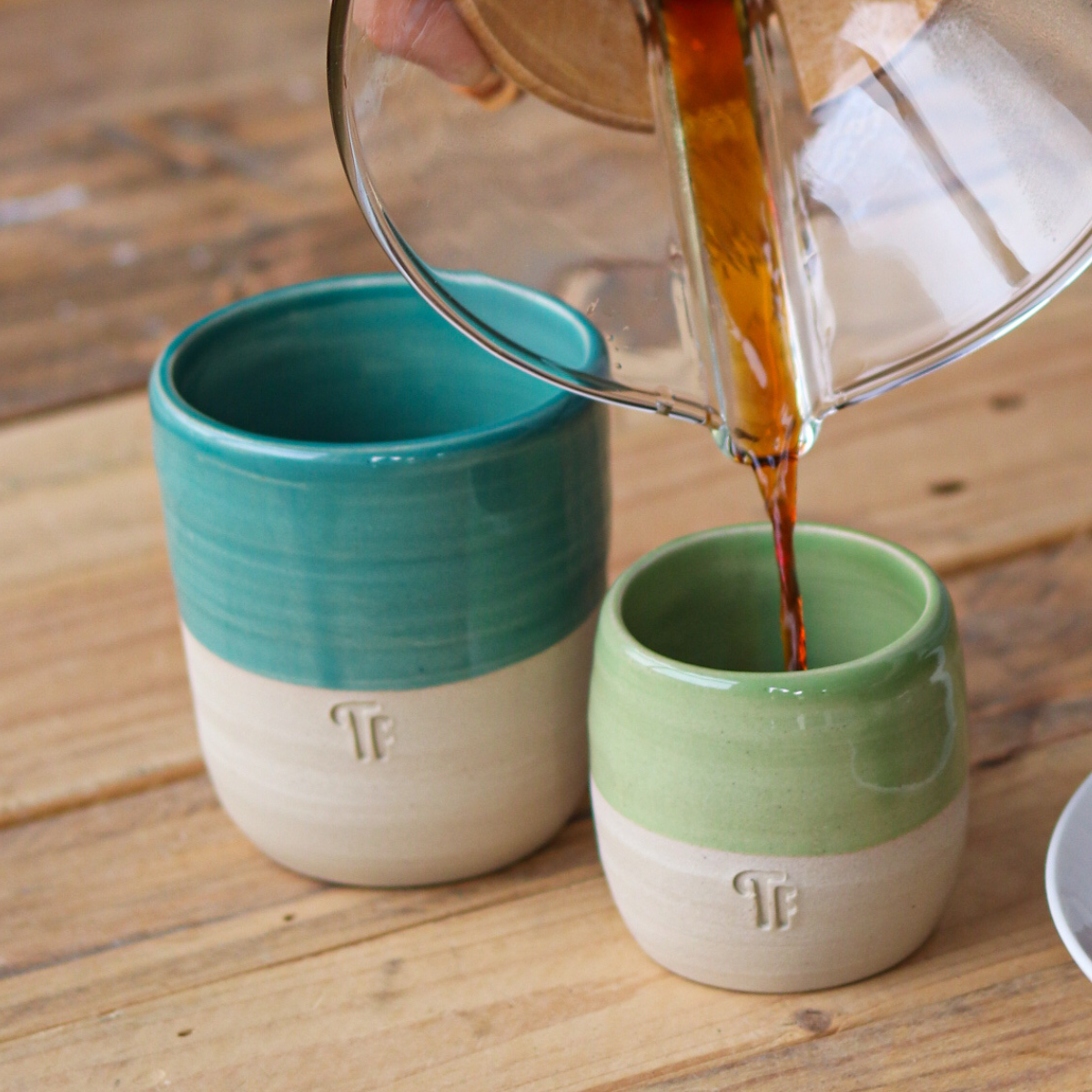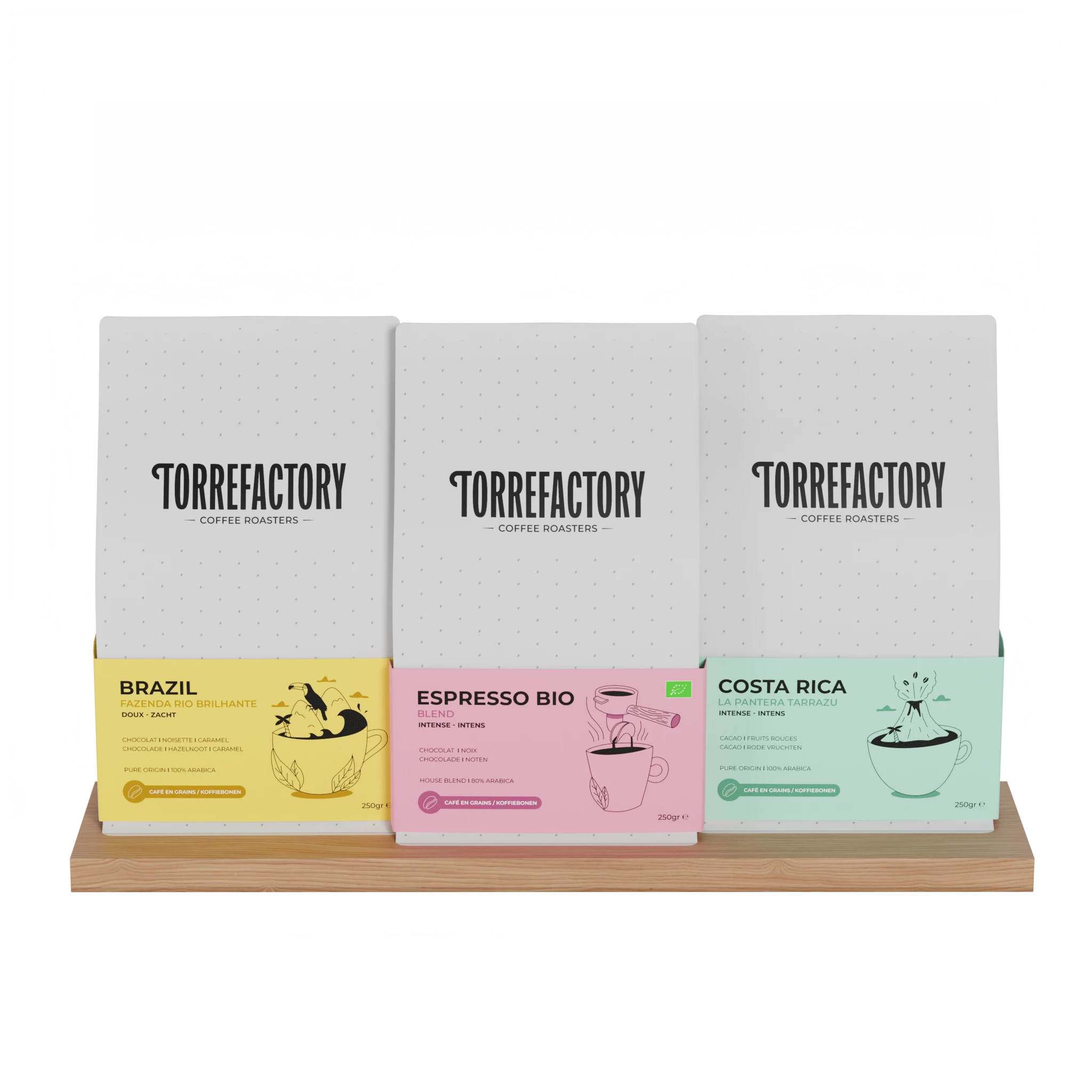Specialty coffee
At the heart of Torrefactory is the specialty coffee shop
She's known as the godmother of specialty coffee. Norwegian-born New Yorker Erna Knutsen was the first to define this type of coffee, typically respectful of all players in the chain, in the 1970s. Specialty coffee is the antithesis of coffee blends. It recognizes the distinctive taste of each terroir and promotes the value of the work of coffee farmers.
When, like us, you share a passion for specialty coffee, you're honoring this visionary woman. It was she who first took the gamble of working with small-scale roasters, who were more inclined to source and pay for exceptional coffee.

First of all, what is a specialty coffee?
A specialty coffee, as defined by experts like Torrefactory, transcends the traditional coffee experience. It's not just a standard morning drink, but a quest for perfection that touches every step of the production chain, from plantation to cup. The term encompasses a philosophy dedicated to excellence, craftsmanship and a deeper appreciation of the unique and complex aromatic profiles that coffee can offer.
Good evaluations
At the heart of specialty coffee is the rigorous selection of beans. These coffees are often grown in specific microclimates that encourage the development of distinct aromas. Torrefactory, for example, focuses on beans that meet and surpass a certain quality threshold during evaluations. These assessments are carried out by experts using a strict scoring system, where only coffees scoring over 80 points out of 100 are considered specialties.
Traceability
Traceability also plays a key role in specialty coffee. Knowing exactly where the coffee comes from, the type of soil it was grown in, the altitude and even the harvesting and post-harvest processing methods, is essential. This transparency guarantees quality as well as respect for sustainable and fair practices for growers.
Quality roasting
The roasting process is just as critical. At Torrefactory, the aim is to bring out the unique characteristics of each batch of beans, adjusting the roasting profile to perfectly balance acidity, body and sweetness, while revealing specific aromatic notes, whether fruity, floral, chocolatey or spicy.
The final step before tasting: preparation
Finally, the preparation of specialty coffee is considered an art. The barista's expertise plays a decisive role in transforming meticulously selected and roasted beans into an exceptional cup of coffee. Brewing techniques, water temperature, granulometry of the ground coffee - every detail counts to express the coffee's full potential.
In essence, specialty coffee by Torrefactory is an invitation to rediscover coffee, not as an ordinary everyday beverage, but as a rich and nuanced culinary experience, capable of captivating the senses and broadening taste horizons!
Specialty coffee: recognition of certified craftsmanship
For us, offering specialty coffees means providing our customers with unparalleled craftsmanship. We have obtained the Certified Craftsman label to formalize our expertise. In particular, it is a guarantee of the traditional know-how we apply during roasting. We proudly display this quality label issued by the Belgian Federal Public Service Economy.
The Torrefactory network, an ethical and sustainable approach
According to CBI, the Center for the Promotion of Imports from Developing Countries, Belgium was Europe's third-largest importer and largest re-exporter of green coffee in 2020.
At Torrefactory, we focus 100% on fair trade coffee. We position ourselves in the specialty coffee market and promote an ethical and sustainable economy in our direct collaborations or through importer Efico. The latter is dedicated to sustainable sourcing practices for all players in the chain, enabling us to market a specialty coffee in line with our values.
Torrefactory supports the Belgian economy
Our strategic partnerships also take place here in Belgium. Our labeling partner is Axedis, an Entreprise de Travail Adapté (ETA) based in Limal, Wallonia. The emphasis here is on employing disabled workers, who apply each label by hand. The company also has an ecological component, renting out reusable tableware for events.
For us, specialty coffee also means ethical practices in our local communities in Belgium.
Cultivating taste with our specialty coffee
To get back to basics, there's nothing like a specialty coffee. The "slow coffee" trend, particularly popular with Anglo-Saxons (who already like to take their time at tea time!), has been growing in popularity since the mid-2010s.
The aim is to extract the coffee's aromas using the gentle method: filtration by manual filter, piston or Aeropress coffee makers. Choose a thicker or thinner grind for a mild to full-bodied result.
What we like about this technique is the freedom to experiment and the rather organic aspect of this preparation method. It lends itself perfectly to the tasting of our pure-origin coffees.
FAQ - Understanding what truly sets specialty coffee apart
What officially defines a specialty coffee?
A specialty coffee is a coffee that has been evaluated according to internationally recognized protocols, notably by the Specialty Coffee Association. To be classified as specialty coffee, it must score above 80 out of 100 in professional tastings. This evaluation is based on aromatic quality, balance, complexity, and the absence of defects. Beyond the score, specialty coffee embodies a holistic approach based on terroir, traceability, quality of agricultural work, and respectful roasting.
Why is specialty coffee not limited to a standardized blending approach?
Specialty coffee is not opposed to blends as such, but to the standardization of flavors. A specialty coffee can be a single-origin coffee or a blend, provided that each component is selected for its quality and traceability. Even within the same farm, washing station, or cooperative, a coffee can combine different Arabica sub-varieties, such as Heirloom, Geisha, or Caturra. The difference lies in the intention, selection, and roasting, which are designed to enhance balance and aromatic complexity rather than standardize flavor.
What role does traceability play in specialty coffee?
Traceability is an essential pillar of specialty coffee. It allows the origin of the coffee, as well as the methods used to grow, harvest, and process it, to be precisely identified. This transparency guarantees the quality of the product and ensures that sustainable agricultural practices are followed. For consumers, traceability gives meaning to the tasting experience and strengthens their trust in the industry. Each specialty coffee thus becomes a transparent product, rooted in a human and territorial history.
Why is roasting so important for specialty coffee?
The purpose of roasting specialty coffee is to reveal the natural aromas of the bean without standardizing them. Each batch requires a specific roasting profile in order to preserve the balance between acidity, sweetness, and body. Over-roasting would mask the coffee's identity, while under-roasting would leave the aromas incomplete. The roaster's work is therefore central to faithfully translating the aromatic potential of specialty coffee.
Does preparation really influence specialty coffee?
Yes, preparation plays a decisive role in the expression of a specialty coffee. The grind, water quality, temperature, and extraction time directly influence the result in the cup. Gentle methods, such as the V60 filter, French press, or Aeropress, often bring out the aromatic complexity better. Each setting becomes a tool for adjusting the balance and refining the taste experience of specialty coffee.
Why is specialty coffee often associated with an ethical approach?
Specialty coffee is primarily based on an ethical and sustainable approach. It values the work of producers by offering fairer remuneration and encourages environmentally friendly agricultural practices. At Torrefactory, this requirement also extends to local partnerships and the overall consistency of the supply chain. Specialty coffee thus becomes a product that is both demanding in terms of taste and committed to human and environmental issues.
Our additional information on specialty coffee :
- Roasting specialty coffee: the secret behind unique flavours
- How best to store specialty coffee purchased online?
- Discover unique flavours with a specialty coffee roaster

 Coffees.
Coffees.  Boxes.
Boxes.  Slow Coffee.
Slow Coffee.  Teas and chocolates.
Teas and chocolates.  Machines.
Machines. 
 B Corp.
B Corp.  Vision.
Vision.  TF.
TF.  Points of sale.
Points of sale. 

